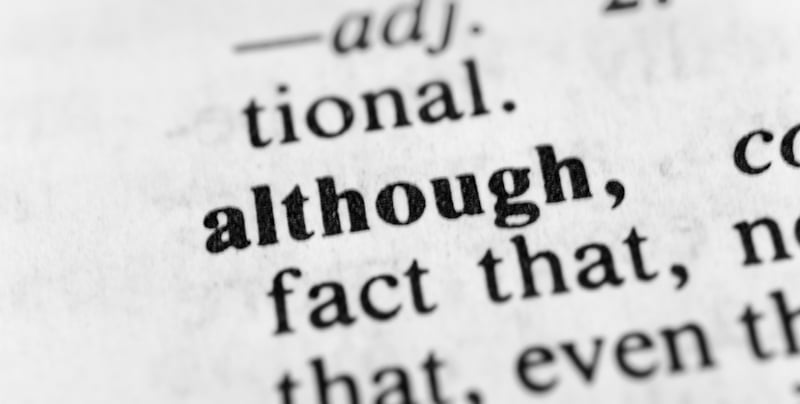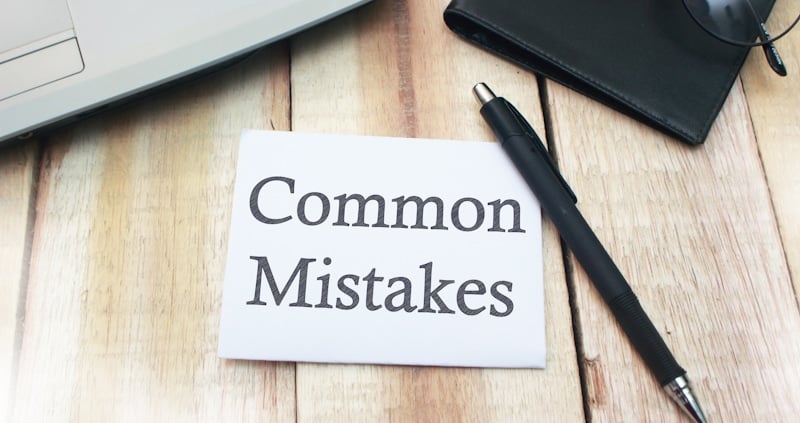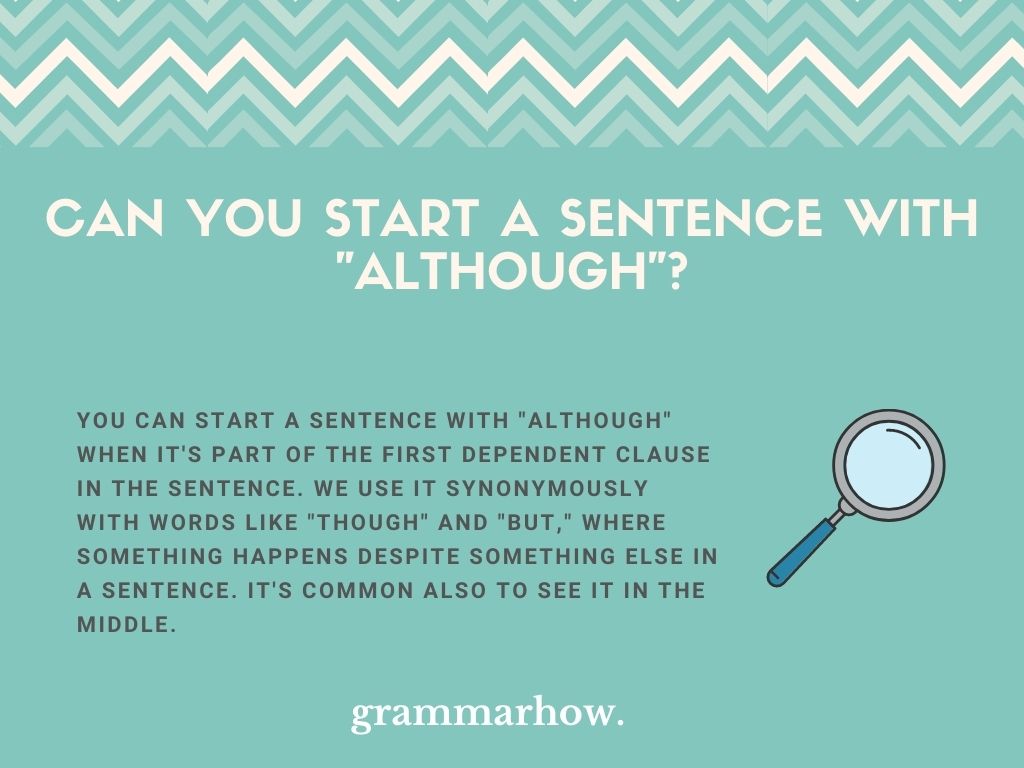The English language is filled with words that we don’t fully understand or often confuse with other words. The word «although» is one of them. Most people seem to think that «although» is interchangeable with other words such as «but» or «however». Let’s take a closer look at the word «although» and how to correctly use it in sentences.
«Although» is actually a conjunction used to convey contrast. However, it can be challenging to know how and when to use it in a sentence. In simpler terms, «although» is used to introduce a subordinate clause which makes the information contained in the main clause relevant.
Definition of «Although»
«Although» is a conjunction or «joining word» that means «even though» or «in spite of the fact that.»
It is used to connect clauses, phrases, or sentences. But the word «although» is primarily used to contrast facts. So the word «although» can be used to say that something is true even if it seems to disagree with the other information, or express different feelings or connect statements that have different moods.
How to Use «Although» in a Sentence
The word «although» is similar to «in spite of» and «despite»». Therefore, it is a means of communicating a contrast or revealing when two things are in conflict. Most people use «although» in a sentence to show a contrast.
Example: Although the park was crowded, they had an awesome time.
A contrast is used when your aim is to convey how two things are not alike, and a comparison is used to prove that two entities are the same or similar. So if you happen to use «although» when trying to weigh up or balance two things, it won’t make much sense at all.
Where to Position the Word «Although»
The word «although» may be positioned in the middle or beginning of a sentence. So «although» can be used to begin a sentence or alternatively may be placed in the middle of a sentence as a conjunction. However, it cannot be used to end a sentence. As a rule of thumb, «although» should be used at the beginning of a sentence or in the middle, after a comma.
Example: Although it gives him heartburn, he loves Pepsi.
Example: He loves Pepsi, although it gives him heartburn.
Where to Place the Noun or Subject
It is important to always use a subject after «although» when you write a sentence that involves «although.» The subject could be a noun such as a person, thing, place, or pronoun that replaces the noun, which may be «she,» «it,» «we,» or «they.»
Example: Although the event was filled to capacity, I still had a great time.
«the event» is the noun following «although.»
I ate the entire pizza, although it tasted disgusting. «it» is the pronoun that replaces «pizza» in the latter half of the sentence.
Following the subject with a Verb
Make use of a verb that describes the subject’s action after you place the subject of the sentence.
Example: My dogs are friendly, although they bark loudly.
«Bark» is the given verb that comes after the subject.
How to Enhance the Contrast Using Qualifiers and Adjectives
Adjectives and qualifiers may be incorporated once you’ve noted a sentence that includes both a verb and subject. This action aims to convey a more comprehensive idea and, of course, enhance the contrast you are trying to show.
Example: Instead of» Although Mike studied, he still failed.»
You may choose to say, «Although Mike studied daily, he still failed the history test.»
Common Mistakes to Avoid
The word «although» should be used in case you want to come across as more formal. Although «although» is seen quite regularly in the English language, it works in much the same way as other joining words like in spite of, despite, and even though. So it is suggested that you use»although» when your aim is to sound formal. But if you are in a casual setting and see it fit to sound more casual, then use words like «though» in place of «although.»
«Although» is not always interchangeable with «though.» «Though» and «although» can in many instances be used in the same types of sentences, but the word «though» is also used as an adverb. So what this means is that «although» is a conjunction and therefore cannot be used the way «though» can in all the same sentences or situations.
Example: On Thursday, though, the mail was busy. «though» in this example is an adverb and not a conjunction. So this sentence does not need a conjunction, and there is no use for the word «although» in it.
Lots of people believe that «although» can be used to replace «however.» These two words are sometimes not the same in terms of how you can use them, so while they have their similarities, you should not use them synonymously. The difference with «however» is that you may use it as an adverb and a conjunction. So «however» may take the place of «although» but not in all instances.
Example: Although his schedule was hectic, he still found the time to relax. This sentence would not make sense if you replaced «although» with «however.»
The word «however» may be used to start a sentence or can also be used after a semi-colon in the middle of a compound sentence. Irrespective of where in the sentence «however» is used, it should in all instances be followed by a comma, and that is the standard rule of thumb.
When using «although» in the middle of a sentence, place a comma before it.
When using «although» at the start of a sentence, you don’t need to use a comma after it.
Example: We had a fantastic day at the pool, although it rained. As you can see, the comma is placed before «although.» The sentence flows smoothly because the word «although» creates a pause.
Be Aware of Sentence Fragments
The word «although» has quite a specific usage and is sometimes mistaken for other words, and this causes a sentence fragment. So when using «although,» always check your statements and sentences for fragments and make the necessary corrections.
Example: Although, the bride was stunning.
Example Sentences with the Word «Although»
Examples with the Word «Although» Used at the Beginning
- Although weeping may endure for a night, joy comes in the morning.
- Although we suffer, we still overcome.
- Although she is young, she is still very independent.
- Although small, the kitchen is still designed well.
- Although she was ill, she went to work.
- Although she’s very old, she’s very active.
- Although the sun was shining, it still wasn’t very hot.
- Although I poured it with caution, it still spilt.
- Although persistence and patience are painful, they can still bring you great benefits.
- Although Jake was once involved in crime, he works hard and earns an honest living these days.
- Although he is poor, he has not lost his integrity.
- Although she entered the contest just for fun, she took first prize.
- Although I don’t have a car, I still get where I’m going.
- Although it doesn’t seem like it, the entire thing is well organized.
- Although they lived there for over a decade, the villagers still treat them as outsiders.
- Although the main characters in the movie are so true to life, they are all imaginary.
Examples with the Word «Although» Used in the Middle
- Certainly, this could happen, although the odds are remote.
- The wood appeared to be cherry, and although it could use a coat of wax, it still had a great shine.
- She always wanted kids, although this is not how she intended to start a family.
- I’m really looking forward to the concert, although there are a million things I need to get done first.
- Mary, although half her age, was still taller by an extra 2 inches.
- She joined Mark at the dining table, although Sharon would have preferred to be alone.
- This was true, although we were at a loss when it came to how she knew.
- She was an accomplished singer and songwriter, although not many had heard of her.
- She knew that there were 10 of us, although no information by conveyed to her.
- All of us took turns wishing Jane a good journey, although she insisted it was unnecessary.
- They loved speaking in their mother tongue, although it sounded strange to everyone else.
- It will be English, although not the language we speak currently.
- I love the winter season, although I hate feeling cold.
- My dogs are enormous, although they are still puppies.
- The thought did cross my mind that, although the dress wasn’t the most expensive, it still looked striking on my daughter.
Conclusion
So as you can see, the word «although» is a conjunction that is used quite often in the English language. But it is important to learn how and when to correctly use it in sentences, whether in the written or spoken form.
Shawn Manaher is the founder and CEO of The Content Authority. He’s one part content manager, one part writing ninja organizer, and two parts leader of top content creators. You don’t even want to know what he calls pancakes.
Asked by: Mr. Reed Heidenreich IV
Score: 5/5
(63 votes)
Position “although” at the beginning or middle of a sentence.
- “Although Tammy was tired, she continued to study.”
- “I love pizza, although it gives me heartburn.”
- “Although my family drives me crazy, I couldn’t live without them.”
- “We danced all night, although we took several breaks for food and water.”
How do you use although in a sentence?
Although Sentence Examples
- Although she had said the words «I love you,» several times, he had not uttered them.
- Certainly this could happen, although the odds are remote.
- Although she was far away, she could see that he was watching her.
- Although she was exhausted, sleep didn’t come.
Do you put a comma before although in the middle of a sentence?
a. Common starter words for introductory clauses that should be followed by a comma include after, although, as, because, if, since, when, while. … However, don’t put a comma after the main clause when a dependent (subordinate) clause follows it (except for cases of extreme contrast).
Is there a comma before although?
The words «whereas» and «although» are subordinating conjunctions. The general rule for subordinating conjunctions states that you shouldn’t use a comma before a subordinating conjunction that comes after the main clause. … They are used where a dependent clause is contrasting to the main clause (a bit like «but»).
Where should we use although?
Although, even though, in spite of and despite are all used to link two contrasting ideas or show that one fact makes the other fact surprising. They can all be used at the beginning or in the middle of the sentence. Despite the rain, we enjoyed the festival. We enjoyed the festival, despite the rain.
21 related questions found
Can I use although and but in the same sentence?
When you use although as a subordinate conjunction to introduce a subordinate clause, there must be a main clause to complete the sentence. So if you use although as a subordinate conjunction in one clause and but as a coordinate conjunction in the other clause, the sentence will be incorrect grammatically.
How do you use although in a conjunction?
Since “although” is a conjunction, place a comma before it when it is in the middle of a sentence. For example, in the sentence, “We had a great time at the park, although it rained,” the comma comes before “although.” This creates a pause that makes the sentence flow more smoothly.
How do you use a comma with although?
When the though/although clause comes before the main clause, we usually put a comma at the end of the clause. When the main clause comes first, we don’t need to use a comma: Even though I earn a lot of money every month, I never seem to have any to spare! I still feel hungry even though I had a big lunch.
Does although need a semicolon?
When the word «however» is used as an adverb (a conjunctive adverb) to introduce an adverbial clause (a dependent clause), a comma should be used before and after the adverb. A semicolon can be used before it if you prefer. … The word «although» is a conjunction only. The same rules apply as above.
Is Though the same as although?
Originally, although was two words—all though—where the all was used to emphasize though. Generally, although is used in more formal writing, though not always. … Though is more often used in speech and casual writing. Additionally, although usually begins a sentence, while though can come at the beginning of any clause.
How do you use Although And however?
The biggest difference between the two is that ‘however’ can be used at the beginning of a sentence, whereas ‘although’ cannot. The two words have very similar meanings. Although means “in spite of the fact that…” and however simply means ‘but’.
Why we use although in sentence?
You use although to introduce a subordinate clause which contains a statement which makes the main clause of the sentence seem surprising or unexpected. … You use although to introduce a subordinate clause which gives some information that is relevant to the main clause but modifies the strength of that statement.
How do you explain although to a child?
The adverbial “although” means the same thing as “despite the fact that”. We use “although” at the beginning of a clause which contains information that contrasts in an unexpected or surprising way with information in another clause. For example: Although it was raining, we went for a walk.
What do you mean by although?
: in spite of the fact that : even though They are good friends, although they don’t see each other very often.
Can although be used as a conjunctive adverb?
This punctuation implies that these words are conjunctions (conjunctive adverbs) that start a new sentence. Instead, whereas and although are conjunctions (subordinate conjunctions) that start dependent clauses.
Can although be used as an adverb?
Although is never an adverb.
Can you start a sentence with although in academic writing?
Yes, you can start a sentence with although! If you start a sentence with an although idea, end the idea with a comma, and follow it with a real sentence. Suppose you wrote “Although the hurricane was headed our way.” This is an extra idea that can’t end with a period.
Can we start a paragraph with although?
1 Answer. There is no grammatical rule against using «although» at the beginning of a sentence or at the beginning of a paragraph. This is more a question of style and how you wish to present the language you are using or the story you are telling.
Should I use although or but?
In almost all situations but and although are synonyms. Although is slightly more formal, and is preferred if you want to stress that both halves of your statement may be true. But is used when you wish to stress contradiction between the halves of the statement.
Is although But correct?
Both clauses are coordinated by although. Using ‘But’ here not only is unnecessary, but, it also suggests that the reader look back, to what ‘Although’ was referring to in a different form. Although is referring to the clause that you are attempting to conjugate with the coordinating conjunction ‘but’.
What is the difference between although and despite?
Both despite and although are used to indicate a contrast; however, there are differences in the way they are used in sentences. The grammatical differences between these two terms are the main cause behind the difference between despite and although; although is a conjunction whereas despite is a preposition.
How do you write a complex sentence with although?
«Although she complains a lot, she’s my best friend.» «Although he acts tough, he’s really a nice guy.» «Although my dog is blind, he can still play fetch.» «Although it’s loud and crowded, I love concerts.»
Is although a complex sentence?
Subordinating Conjunctions in Complex Sentences
The most common subordinating conjunctions are although, because, before, even though, if, since, until, and when. In these examples of complex sentences, the subordinating conjunctions are shown in bold.
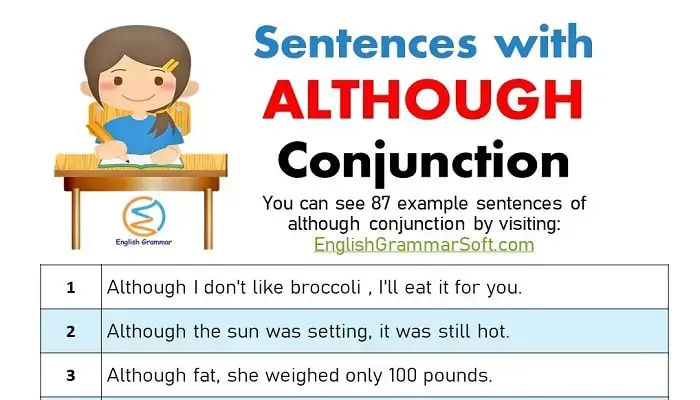 Pin
Pin
Although is used as a subordinating conjunction and usually interrupts the flow of the main clause. Here are 87 example sentences with although conjunction.
Read also: Types of Conjunctions with Examples
- Although I don’t like broccoli , I’ll eat it for you.
- Although the sun was setting, it was still hot.
- Although fat, she weighed only 100 pounds.
- Although he was very rich, he lived in a small, old house.
- Although the team had to endure steep challenges and tough opposition, they made it through obstacles and got back to winning ways.
- Although I like her, I didn’t invite her to the party.
- Although we don’t currently have any open positions, we’ll keep your application on file and give you a call if we think you’d be a great fit with our team.
- Although he was trained in the use of firearms, the accused has no criminal record and is not known to police.
- Although we live far apart, we try to spend time together.
- Although the governor says the museum will bring in business, many locals are skeptical.
- Although she asked to leave early, her supervisor refused her request.
- Although the argument is strong, I need to make sure we have enough data to prove it.
- Although the first time I used the helmet, it was a little stiff and tight on my head.
- Although it lacked a steering wheel and brake pedals, the Virginia driverless car completed a 321-mile trip between Charlottesville and Richmond last week.
- Although I hadn’t expected anyone this early, I nevertheless forced a smile.
- Although the man was wealthy, he was not happy.
- Although we know we shouldn’t sleep with this much square footage in our eyes, we still do it.
- Although the price of corn-based ethanol appears to be forever rising, it will continue to be the main renewable fuel.
- Although the power is out, you can still complete your homework assignment.
- Although I don’t smoke, these cigars are so good.
- Although the weather is cool, our climate never causes us to become ill.
- Although a terrible cook, he is a good man.
- Although the bread looks burnt, it’s actually quite fresh.
- Although the sky grew darker, Kyle continued to run.
- Although he couldn’t see the trees in front of him, he could hear their leaves rustling in the wind.
- Although his feet ached and his lungs burned, he kept pushing forward.
- Although the crust appears dark, the bread is actually quite fresh.
- Although the outside might seem a little burnt, the inside is actually quite fresh.
- Although he was the son of a poor peasant, he managed to succeed because he worked hard.
- Although it is hard work, I enjoy practicing my hobby.
- Although she was underage and too young to drink, she managed to talk her way into buying alcohol by flirting with the bartender.
- Although we fought all day and night, we managed to resolve our differences.
- Although I was late, the teacher forgave me.
- Although they said not to, I did it anyway.
- Although you may think of a bad plan, there’s a good one also.
- Although she feels remorseful she can’t apologize.
- Although he is a genius, he still has a lot to learn.
- Although there were difficulties with the work, Roberts did not want to discuss them.
- Although he knew that Phil did not like him, he did not think that there would be any serious problems between them.
- Although she asked to speak with her manager, she was told that she should speak with Mr. Jones first.
- Although being overweight might be considered unattractive by some people, it is not a cause for concern for the majority.
- Although he had lied about his credentials, his experience was impressive enough that they hired him anyway.
- Although long, the film kept me entertained until the end of the film.
- Although she had never attended a school dance before, Cynthia nevertheless went to her first school dance with great enthusiasm.
- Although new to political involvement, Cynthia joined her local Democratic party with gusto.
- Although we did not intend to arrive early, we managed to get there before the others.
- Although we knew that we would not enjoy it, we decided to go any way.
- Although he may be famous, he still works at his job.
- Although I had seen it before, it still amazed me when I arrived in Las Vegas.
- Although we were tired, we went out to eat.
- Although it snowed heavily, we decided to cancel the holiday plans.
- Although they waited for two hours, they decided not to see the movie.
- Although they said it would snow, we decided to go on holiday.
- Although he was exhausted, he had to finish the trip into town.
- Although she was really tired, she didn’t go to bed.
- Although my friend was feeling really ill, she still made it to work.
- Although my daughter is sick, she is still attending all her classes.
- Although she couldn’t attend the meeting, my boss still sent his apologies.
- Although her training hadn’t started, she decided to start running anyway.
- Although the paperwork was complete, they decided to hold off on submitting their application.
- Although they have eaten dinner, my kids are still hungry.
- Although the rain ruined our picnic, we decided to hike.
- Although not yet graded, this coastline is still popular with tourists.
- Although Malaysia located on the equator, it actually is a country of multiple climates and vegetation types .
- Although angry, Michelle was not going to hit him.
- Although angry, Michelle thought it was funny that her brother had a crush on a girl who didn’t even know he existed.
- Although angry, Michelle felt really good inside.
- Although angry, Michelle smiled at her brother.
- Although the economy is not so bad, there are still opportunities to save money.
- Although you are not home early, you can talk on the phone with your parents with Skype.
- Although I have two tests tomorrow, I think that I will pass with good scores.
- Although your daughter is very beautiful, but her grades are very disappointing.
- Although my friend Harold has a degree in business, he never works for himself.
- Although you have never been to China is not an excuse for not knowing Chinese history.
- Although it was snowing, I went outside.
- Although he grew up in the city, he loves living in the country.
- Although they were late, they still arrived before us.
- Although there wasn’t a seat for me, I still wanted to go see the movie.
- Although she lives alone, she doesn’t worry – her dog keeps her company.
- Although their house is old, it’s still a beautiful home.
- Although he had never owned a car, Robert was an excellent driver.
- Although the weather was fine, the wind was cold.
- Although the team played well, they lost.
- Although he knew she would succeed, he was afraid for her.
- Although I don’t like him, I admit I respect him.
- Although they are nice people, I don’t really want to know them better.
- Although she likes to talk, her husband is quiet.
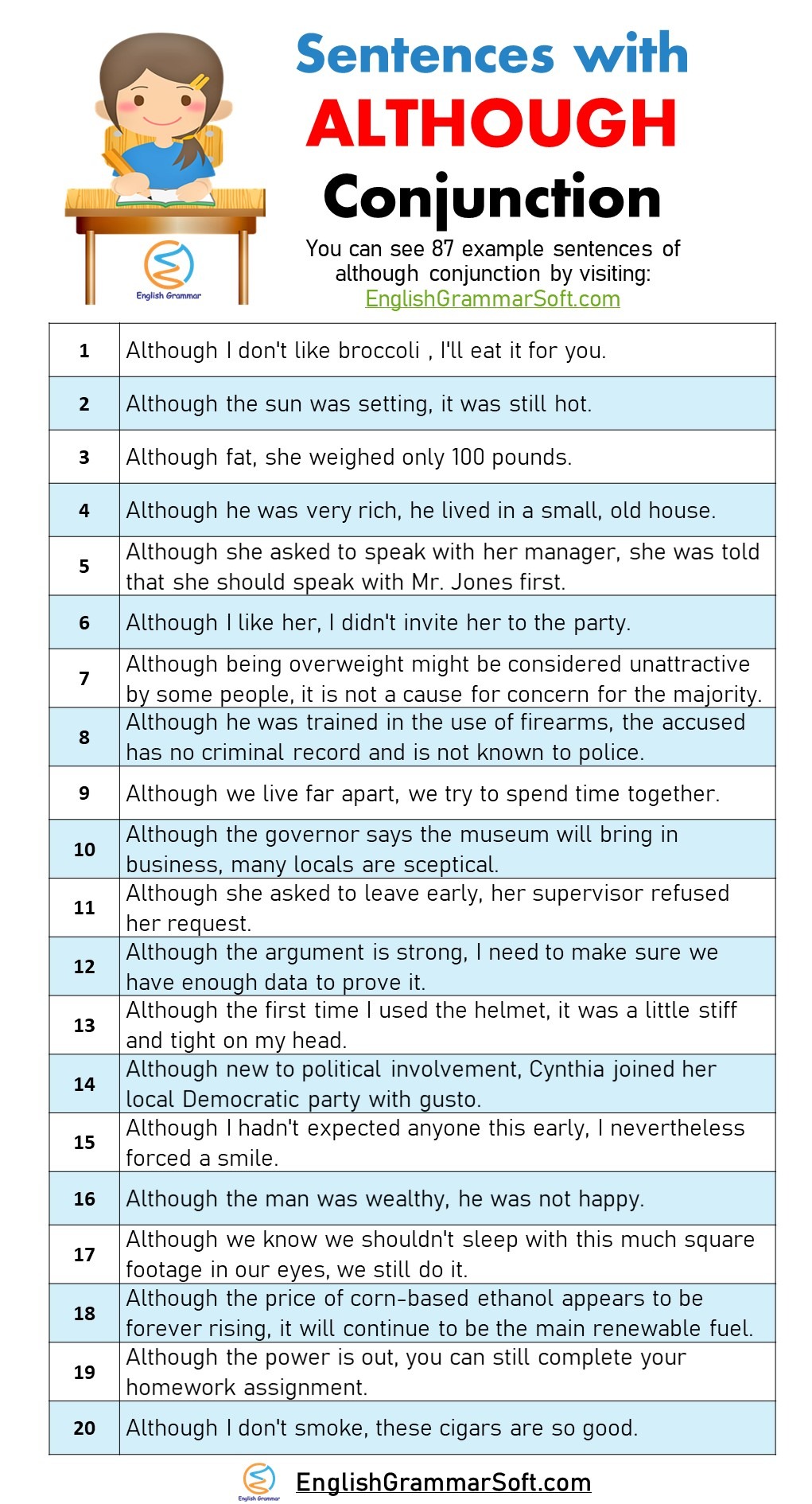
Read also
- No Sooner Than Sentences (31 Examples)
- Examples with Neither Nor (50 Sentences)
- Sentences With Semicolons (;) 50 Examples
- Sentences with Either – or
- 50 Example Sentences with However
- Do Does Did Sentences (50 Examples)
- Has Have Had use in sentences | 50 Examples
- Was Were Sentences | 50 Examples
- There is – There are Sentences | 50 Examples
- Is am are sentences in English (50 Examples)
1. Although it rains, throw not away your watering pot.
2. Although the world is full of suffering, it is full also of the overcoming of it.
3. No man knows when he shall die, although he knows he must die.
4. They are generous although they are poor.
5. Although she is young, she is very independent.
6. Although he was ill, he went to work.
7. Although small, the kitchen is well designed.
8. Although again sweet candy, also has a bitter day.
9. He was honing his razor although it’s very sharp.
10. He keeps at his studies although he is ill.
11. Although he’s quite old he’s still very active.
12. Although he’s nearly 80, he is still very active.
13. Although the sun was shining it wasn’t very warm.
14. Although I poured it carefully, I still managed to spill some.
15. She walked home by herself, although she knew that it was dangerous.
16. Although patience and persistence is a painful thing, but it can gradually bring you the benefits.
17. Although Bill has been in trouble with the police,he earns an honest penny these days by driving a van.
18. I like her, although I could cheerfully throttle her at times .
19. Although there is no overt hostility, black and white students do not mix much.
20. He went through with his plan although all his friends advised him to abandon it.
21. Although she is very poor, she has not lost her dignity.sentencedict.com/although.html
22. Although we still depict nostalgic snow scenes on Christmas cards, winters are now very much warmer.
23. Although he had only entered the contest for fun, he won first prize.
24. Although officially a dependent territory the island is effectively autonomous.
25. Although I moistened it, the flap doesn’t stick to the envelope.
26. Although the main characters in the novel are so true to life, they are imaginary.
27. Although my car is very old, it still runs very well.
28. Although it doesn’t look like it, the whole thing is highly organized.
29. He hopes to live in although his home is not far from the college.
30. Although she’s lived there for ten years, the villagers still treat her as an outsider.
“Although” is a great way to start a sentence, but it seems that some people believe it’s not possible. This article will teach you how starting a sentence with although works and how you can be comfortable doing it yourself.
You can start a sentence with “although” when it’s part of the first dependent clause in the sentence. We use it synonymously with words like “though” and “but,” where something happens despite something else in a sentence. It’s common also to see it in the middle.
To help you understand a little more about it, you can refer to this example:
- Although he didn’t want to go to the park, he still had a good time there.
“Although” works well to talk about a contradicting piece of information.
It’s important to remember that it’s part of a dependent clause. This means that it “depends” on another clause in a sentence because it would be incorrect on its own. Without the second clause, “although” can never start a sentence.
What Does “Although” Mean At The Beginning Of A Sentence?
At the beginning of a sentence, “although” means despite other information, something contradictory happens. We use it as part of a dependent clause to talk about how two things seem to contradict or counter each other in some way.
As we’ve mentioned, the dependent clause portion of “although” is what’s most important here. For example:
- Although he wasn’t meant to be there.
The above sentence is incomplete and, therefore, incorrect. We can’t just use a dependent clause like this without any further information. Instead, we should write something like this:
- Although he wasn’t meant to be there, he couldn’t help but show up.
The two clauses are important. We’ll get to why that’s the case and how the punctuation works a little later.
Examples Of How To Use “Although” At The Beginning Of A Sentence
We think it’s time to share some examples with you. That way, you’ll have a much better understanding of how “although” can start a sentence correctly.
- Although she didn’t like him very much, they still went on a date and got to know each other.
- Although there wasn’t much food left in the fridge, we made do with what little we had left.
- Although I couldn’t find the right way through the maze, I still managed to find areas that had not been explored.
- Although there was nothing more to do there, they made the most of their time.
- Although you are the smartest person in this class, you still failed the exam, which shows that no one is above revising!
- Although you think you’re attractive, I can assure you that nobody is into your personality.
- Although there isn’t anything left to offer you, you can take my advice with you before you go.
“Although” works well to introduce a counterpoint or contradiction as part of a dependent clause. We do this by adding the independent clause after the sentence with “although” in it, which works well to introduce two varying points.
Where Should I Place The Comma When Using “Although” At The Beginning Of A Sentence?
Punctuation rules are fairly simple when you know what you’re looking for. We’ll show you how to punctuate “although” correctly when used at the beginning of the sentence because the rules are different from when it’s used in the middle.
You should place a comma after the dependent clause has finished. There should always be a comma present to break up the dependent clause from the independent clause. However, there is no need to place a comma directly after “although.”
To show you how this works, you can look at the following two examples:
- Correct: Although I didn’t want to see you today, I still had a lot of fun talking to you.
- Incorrect: Although there wasn’t much left of the shipwreck I thought it was incredibly interesting to explore.
As you can see, the comma is vital when trying to split up the two clauses. Without it, the sentence won’t have a break in it, which will make it harder for readers to understand what is going on.
Alternatives To Starting A Sentence With “Although”
“Although” isn’t the only word we can use to start a sentence in the same way. When introducing two contradicting ideas or arguments, you might find some use from the following synonyms:
- Though
- Even though
- Despite
- In spite of the fact that
- Despite the fact that
- Notwithstanding that
- Even if
- For all that
- But
Most of these synonyms work well to start a sentence in place of “although.” We still need to split the dependent clause from the independent clause when writing in this way, though.
Can You End A Sentence With “Although”?
There are no rules in English that specifically tell us that certain words can or cannot start a sentence. However, there is a clear rule associated with style and necessity. If a word does not belong in a certain part of a sentence, we can never use it there.
“Although” is one such word. It’s a conjunction, meaning that it works really well to connect two sentences together. However, we can only connect two sentences together by starting a new sentence with it or by introducing two clauses with it.
There are no cases where we can end a sentence with “although.” In doing so, we will not be able to use it to connect two sentences together, which is the only way we can use “although” correctly.
How Do You Use “Although” In The Middle Of A Sentence?
While incorrect at the end of a sentence, we can still use it in the middle.
“Although” works well in the middle of a sentence when we place the dependent clause after the independent clause.
The clauses work in the same way as we’ve mentioned above; they’re just swapped around. These examples will show you what we mean:
- He didn’t think much of it, although he saw something really bad.
- She wasn’t going to give up easy, although she knew she didn’t stand much of a chance.
You might also like:
Can You Start A Sentence With “Though”? Learn It Here! (With Examples)
Can You End A Sentence With “Though”? Learn It Here! (With Examples)
Can You Start A Sentence With “Even Though”? Learn It Here! (With Examples)
Albeit vs. Although – Difference Explained (With Examples)
Martin holds a Master’s degree in Finance and International Business. He has six years of experience in professional communication with clients, executives, and colleagues. Furthermore, he has teaching experience from Aarhus University. Martin has been featured as an expert in communication and teaching on Forbes and Shopify. Read more about Martin here.

